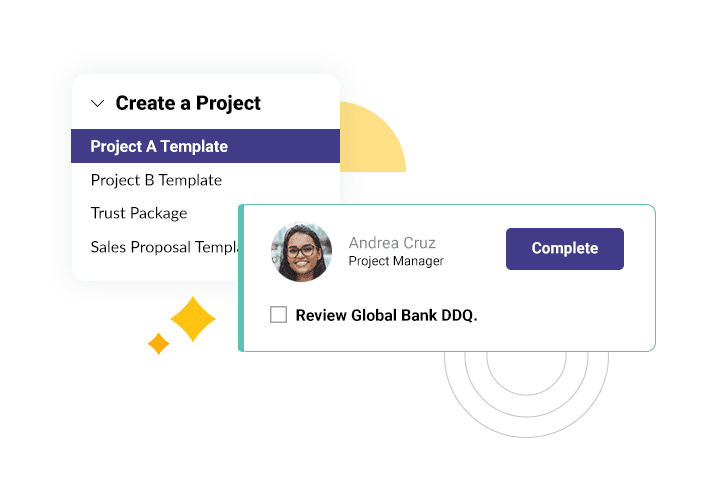Due Diligence Software
Answer Questionnaires,
Quickly & Compliantly
Deliver the best DDQs using Loopio’s due diligence software.
You’ll never have to choose between compliance and speed again.
Trusted by 1,500+ Leading Brands
Finish DDQs in Hours, Not Days
Save time through intelligent automation that detects questions and suggests answers—no manual entry required. Learn why Financial Services companies trust Loopio.

What's Due Diligence Software?
Due diligence software is a helpful tool for anyone in proposal management. This software allows teams to collaborate on complex documents issued during the procurement process, such as due diligence questionnaires (DDQs).
For instance, automated due diligence software can be a big help if you have to complete due diligence forms quickly. It automatically fills in fields for you, ensuring accuracy and freeing up time so you can focus elsewhere. So, what other advantages do the best due diligence software offer? Keep reading to find out.
Your Due Diligence Software Checklist
A due diligence software checklist helps find the right software for your business. Keeping track of all requirements during the buying process can be challenging, so outlining your desired features ahead of time can force you to think about what you actually need in the software. Specifically, a product due diligence checklist will help you keep track of products or features that are must-haves for your team’s collaboration platform.
Example Checklist: Six Steps to Buying Due Diligence Software
- Examine your process
- Define your requirements
- Research vendors through platforms like G2
- Evaluate the products
- Get internal buy-in
- Implement the platform
Similar to the general example above, a technology due diligence checklist (or technical due diligence checklist) may be more beneficial for those working in the software or IT industries. For example, if you work in finance, you’ll want to tailor your approach to include a specific financial due diligence checklist.
The bottom line: it’s important to look for something closely aligned to your business objectives. Strive for a tool that complements your existing workflows—instead of complicating them.
There are many items to include in a due diligence checklist, so we recommend you start with a sample checklist covering the main steps you should consider when purchasing due diligence software.
The main steps include vendor research, top feature evaluation, and team buy-in. Doing your research is extremely important at this stage, and this checklist helps you hit all of the critical points.
The Best Due Diligence Software
Finding the best due diligence software for your business is essential to simplifying the due diligence process. Questionnaires play a major role in this process, so ideally, your software of choice should be able to support you in automatically answering some of those questions—filling in fields according to pre-set criteria.
Due diligence questionnaire software is useful for several reasons, but perhaps most importantly, it helps move through your workflow at a much quicker pace. (Especially if you tend to answer the same question, over and over again.)
When answering due diligence questions, you’ll want to make sure that you have the appropriate information available at your fingertips—so you don’t have to dig through your company’s SharePoint. The due diligence process can be simplified, however, with a software due diligence checklist, which helps ensure you’re choosing the right software for your particular needs. You might also consider using a due diligence app, if you prefer to manage your due diligence tasks on the go.
With the proper due diligence software, you can adequately track and assess each candidate and see whether or not their business goals and processes align with your own. Doing your due diligence upfront can save you time and help avoid pitfalls down the road. This is why it’s important to invest in software that can help you keep track of multiple tasks related to the RFP process.
Benefits of Automated Due Diligence Software
Those responsible for due diligence project management find tremendous value in automating the repetitive tasks, so they can focus on more strategic work. That’s why automated due diligence software is such a big help—it fills in answers to questions automatically, which significantly speeds up the due diligence process.
Loopio offers due diligence management software that helps companies spend 35% less time answering DDQs. (Below are examples of success statistics from customers across North America.)
This software is a great option for businesses that want to be able to access all of their information in a single, centralized platform. Loopio’s platform also functions as a proposal software and RFP automation software. It allows you to access any answers you need quickly, without sorting through a stack of spreadsheets and Word documents.
Streamlining your workflow in this way has big benefits: it encourages a smoother process and promotes better collaboration, as everyone has access to the same information and can self-serve.
Using Third-Party Due Diligence Software
If you lack the internal resources to create due diligence tools from scratch, you might consider purchasing third-party due diligence software. In addition to due diligence, there are other types of software you can get from third-party providers, including conflict of interest software, ethics and compliance software, and policy management software.
Beyond this, it’s important to remember that every third-party risk management framework is different. Not all providers offer risk management tools that deal with the exact same types of issues, so you should do your research to determine whether or not that software is compatible with your business.
A third-party risk management guide can give you a better understanding of what proper risk management entails and how you can leverage software to manage and automate due diligence tasks.
What's Financial Due Diligence Software?
Due diligence software can be used by businesses across all industries, but it’s especially helpful for Financial Services.
Financial due diligence software helps users perform an investigative analysis of a company’s financial performance. This analysis might include a deep dive into that company’s recent financial statements, as well as their current inventory and debt. To get a better understanding of how due diligence works in the financial world, check out a financial due diligence report sample—or detail the findings of a full financial due diligence report.
Loopio’s software helps both Financial Services and Asset Management companies by enabling users to complete DDQs more efficiently. It saves time through automation, which suggests answers to DDQs automatically, eliminating the need for manual entry. An example of this is seen through the team at HedgeServ, who reduced DDQ response times from 3 days to 4 hours.








